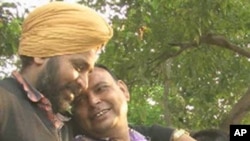Gay rights activists in India are seeking broader acceptance for homosexual men, lesbians and transgenders that goes beyond legal protection against criminal prosecution. But change is slow to come. It was just in July 2009, when the Delhi High Court repealed Section 377 of the Indian Penal Code, the law that made same sex activity illegal in India.
Homosexual men, lesbians and transgenders in New Delhi are marching to the beat of a new era. Since the Delhi High Court decriminalized consensual homosexual activity between adults, some gays have felt more comfortable "coming out" about their sexuality and attending functions like this gay pride parade in New Delhi late last year.
For Sambhav Sharma, the repeal of the law gave him the courage to tell his grandmother that he is gay. To show their support, family members joined him in the parade. "This is the consequence of Article 377. Because of that, I was able to convince my family to come down here and celebrate my 'Azadi,' my freedom," he said.
Many gay men and women in India are not as comfortable as Sharma acknowledging their sexuality. In a conservative society like India, homosexuality is still widely taboo. That is why these parade participants wear masks to hide their identities.
Anjali Gopalan is the founder and executive director of the Naz Foundation, a non-profit organization that works on HIV/AIDS and sexual health issues in New Delhi. "I think the battle now is the battle for rights. The battle has to be for the right to marriage, the right to adopt, the right to inherit - rights which citizens of this country take for granted. And when I say citizens of this country, obviously the people who are taking it for granted is the heterosexual community because gay people don't have these rights. That's the long battle now."
Gopalan says that even in metropolitian areas, some parents think they can change their homosexual children - make them heterosexual - with electric shock treatments. Others believe homosexuality can be cured in some way.
That is what teacher Rajendra Narula believes. He attended a recent event in Delhi called "Gay Rights are Human Rights." "I think it's possible to treat homosexuality. It's just a matter of taking some hormones or counseling and it's absolutely correctable," he said.
Gopalan says Narula and others who consider homosexuality an illness, or wrong, need to be taught that is not true. And both she and Sharma say as India develops they hope the government will give more rights to homosexuals.
"This is just the beginning. Everywhere we want our legal rights. That can be achieved by the recognition that the government will give us. And it will happen."




